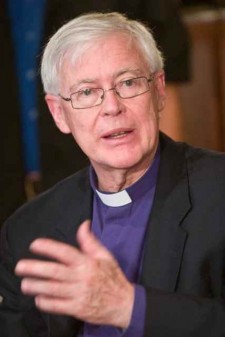 The GAFCON statement and the Jerusalem declaration is the centre of a new push in England, packed out an English Church and has drawn headlines across the country.
The GAFCON statement and the Jerusalem declaration is the centre of a new push in England, packed out an English Church and has drawn headlines across the country.
Just two days after the close of the conference, Archbishops Jensen, Venables and Orombi addressed 800 english clergy in All Souls, Langham Place in London, touching off reactions around the country.
The turn out was greater than expected, with Dr Jensen telling the crowd that it was time to make a stand against revisionist theology.
Dr Jensen said clergy may have preferred to stand on other issues, but this was the challenge they were presented with.
“If you will not stand on this issue you will never stand.” the Archbishop said.
Later, in an op-ed page article in the Sydney Morning Herald on Friday, Dr Jensen said “I don’t expect any Australian church-goer to notice changes here because of GAFCON. These events are being played out on the world stage. But we too have our part to play in this Anglican renewal and the first step is to recognise the crisis and that GAFCON is part of the solution.”
He has also described the Primates council as a ‘body of integrity’ and commended the seven leaders for being willing to help the church in this crisis.
Archbishop Venables, of the Southern Cone, told the All Soul’s meeting that GAFCON is not a breaking away from the Communion or trying to grab power.
“It is the exercise of legitimate authority within and for the sake of the Anglican Communion, to do what needs to be done, to be a rallying point where people can come together on the essentials and on the Lord Jesus Christ.”
Earlier, the Archbishop of Canterbury had given a cautious statement on the Jerusalem declaration, saying it contains “much that is positive and encouraging”.
But he criticised the GAFCON measures, and said organisers should “think very carefully about the risks entailed.”
Despite some knee-jerk reactions to the GAFCON statement, others take a longer view.
Well known scholar, Alister McGrath, Professor of Historical Theology at Oxford University, has written in the Times Newspaper that GAFCON “...will not mean the end of Anglicanism, nor even the beginning of its permanent decline. Paradoxically, the future might actually be characterised by overall growth, rather than contraction. Much will depend on what happens at Lambeth in the coming weeks.”






















